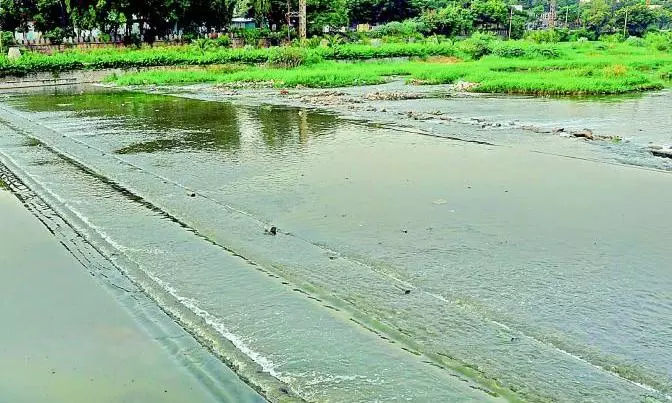Saving Musi: Can an Aquapolis Restore Hyderabad Water Heritage?

Hyderabad: For the Musi River to truly come alive, the entire ecosystem of Hyderabad’s water network has to breathe together. That’s the fundamental insight behind the idea of the Aquapolis, a reimagining of Hyderabad as a city intertwined with its lakes, nalas, and rivers, not just as mere water bodies, but as an interconnected, living system.
This was the takeaway from the "Water and Metropolitanisation" workshop, a two-week effort led by Les Ateliers with support from the French Embassy and the state government.
Global and local experts came together to rethink the city’s relationship with its waters.
“The Musi is not just a corridor. It’s part of a vast ecosystem,” observed Reena Mahajan, architect and co-pilot of the workshop.
"You can’t save Musi without saving the smaller water bodies feeding into it, and you can’t revive the lakes without including the people who depend on them,” she said.
The workshop reframed the Musi Riverfront Development Project as an “ecosystem regeneration” project. What emerged was not any specific plan but a call to action to reawaken the city’s relationship with water.
And that’s where the idea of Aquapolis takes shape: a city that reconnects its people with its waters.
Take Hyderabad’s shrinking lakes, for instance. Over the years, the city has lost countless smaller water bodies to urbanisation.
“When a small lake disappears,” Mahajan explains, “you lose more than water. You lose the daily life that used to revolve around it. Families used to farm near these lakes, birds migrated to them, and they were critical for groundwater recharge. Without these small lakes, the larger system collapses.”
The workshop underlined the urgent need for a shift from centralised solutions to community-driven, localised ones, which are also cost-effective.
“Rather than wait for the city’s dirty water to reach a treatment plant miles away, why not treat and reuse it at the source?” Mahajan wonders.
Simon Brochard, geographer and director of the workshop project, called pollution the heart of the challenge, with Hyderabad’s water system interconnected and complex.
“We really hope that through this workshop and the government of Telangana, we can promote nature-based solutions, which are low-cost and very doable ones. Pollution is at the heart of the challenges in this city, hence the need for an active involvement of all stakeholders.”
Enter the concept of sponge cities, a modern approach to managing water by mimicking nature. It’s about using green zones, wetlands, and porous soil to capture and filter rainwater where it falls.
The participants insisted that communities have to be a part of any solution. One idea was to create a network of water cooperatives, while some felt that the proposed “Water Ripple” app, which gives real-time data on water quality and flooding risks, could empower citizens to take ownership of their lakes and nalas.
“When people reconnect with their water bodies, they protect them,” Mahajan says.
This human-centric approach doesn’t just stop at communities. It extends to those who have been historically excluded from formal systems. Kabadiwalas, for instance, can play a role in keeping the water bodies clean. The workshop suggested integrating them into a formal structure, with better pay, social security, and defined roles in recycling and waste management around lakes and nalas.
Officials involved in the Musi project acknowledge the challenges ahead but see the potential.
“The workshop gave us ideas we hadn’t considered before, especially the importance of smaller lakes and local solutions,” an official said.
For all the ambitious expectations, the Aquapolis vision circles back to one simple idea-Water heritage is Hyderabad’s lifeline.

